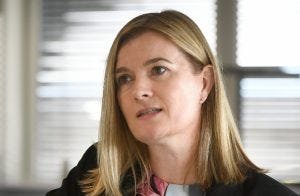October 21, 2020

Touchlight hires Lonza’s Karen Fallen as CEO of its contract manufacturing organization, Touchlight DNA Services.
Fallen joins Touchlight from Lonza, where she began working after the latter company’s acquisition of Celltech in 1996.
By the end of her time at Lonza, Fallen held the position of head of mammalian & microbial development & manufacturing, where she was responsible for a workforce of 4,500 individuals, spanning 10 different sites.

Karen Fallen will lead Touchlight DNA Services
Fallen’s new organization is Touchlight DNA Services, based in Hampton, UK, which produces synthetic DNA that is used as starting material for lentivirus and mRNA, as well as other advanced therapies.
When asked by Bioprocess Insider what prompted the decision to join Touchlight, Fallen explained that it was made with the desire to join “an expanding, forward-looking company.”
In terms of her remit, Fallen said, “We aim to widen our current client base, to add further major industry players as partners. It is essential to reliably deliver DNA as a critical starting material for advanced therapies, and vaccines. It is critically important that our customers get the right supply chain in place in order to deliver the revolution in genetic medicines.”
This comes at a time, during the current pandemic, where there are several mRNA and DNA vaccine research programs underway against COVID-19.
Currently, demand is outweighing available capacity and DNA production has “become a bottleneck,” Fallen noted.
With the ability to manufacture its ‘doggybone’ (db)DNA in large quantities and on rapid timelines, the company stated, this platform offers an alternative to plasmid DNA production.
Fallen outlined that the synthetic DNA has been validated as comparable to plasmid DNA ‘across numerous client productions systems’, with advantages including speed of production, a smaller footprint, in the form of benchtop equipment and disposable contact materials, improved scalability and superior safety, through the elimination of bacterial sequences.
With the growth of cell and gene therapies dependent on plasmid DNA, it is not just COVID-19 vaccine developers that Touchlight anticipates providing services to.
Fallen noted that as more cell and gene therapies reach the commercial stage, as well as more of such projects at research stages, demand for plasmid DNA was already rising prior to the pandemic.
Whilst the pandemic, and the increased rate of development, could also bring first-in-class vaccines to the fore, such as nucleic acid vaccines, Fallen added. This could lead to the exploration of this type of vaccine in further indications, increasing demand for DNA plasmid starting material in turn.
Touchlight’s two-pronged approach
Touchlight DNA Services is just one arm of the overall business, with Touchlight Genetics being a DNA therapeutics biotech that aims to develop vaccine and non-viral gene therapy assets.
In April of this year, Touchlight Genetics appointed Helen Horton as chief research officer to aid in developing the pipeline of products that utilize its dbDNA platform. Horton arrived at the company from Johnson & Johnson, where she held the role of senior scientific director and immunology expert.
At present, the company has two programs made public, TGL-100, which is a vaccine being explored for head and neck squamous cell carcinoma, as well as other solid tumors, and TGL-210, a vaccine against COVID-19.
The latter vaccine was announced in August of this year, which the biotech stated could be delivered through nasal and intradermal routes. In addition, the vaccine could be formulated as a dried product for longer-term storage.
About the Author
You May Also Like







